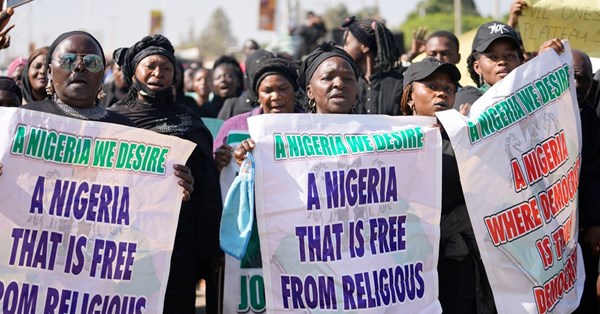FOR once, Christians in Nigeria have reason to hope. After years of bloodshed, silence, and official denial, the United States Congress has taken a stand (News, 28 March). It has recommended that Nigeria be designated once again as a “Country of Particular Concern” (CPC) — a move that brings with it the possibility of sanctions, visa bans, and deep diplomatic pressure. To the persecuted faithful in the Nigerian Middle Belt and beyond, this is more than policy. It is a breakthrough: a flicker of light in a very long night.
The hearing in Washington was unflinching. The Subcommittee on Africa of the House Foreign Affairs Committee heard devastating testimony from the RC Bishop of Makurdi, Dr Wilfred Anagbe, and others, who have lived through the terror. They described church burnings, mass killings, gang rapes, and the systematic destruction of Christian communities by Islamist militias. Eight churches were razed in Bishop Anagbe’s own diocese. These are not isolated incidents or clashes over farmland, as the Nigerian government insists. They are acts of religious cleansing.
“Make no mistake — these attacks are religiously motivated,” the congressional report declared. “Denying this reality contradicts the overwhelming evidence we have seen with our own eyes.”
That blunt honesty is something that is rarely heard in Nigeria. For years, both the Buhari and Tinubu governments have dismissed the persecution of Christians as either fake news or tribal squabbles. The Foreign Ministry still insists that the crisis is “complex”, blaming it on bandits, communal tensions, and vague criminality. But we in Nigeria know the truth: we live it.
The data back us up. Between 2019 and 2024, the Observatory for Religious Freedom in Africa (ORFA) recorded 55,910 killings and 21,000 abductions by terrorist groups in Nigeria. Islamist Fulani militias were responsible for nearly 40 per cent of all civilian deaths, targeting Christian farmers in particular. These militias move in large numbers, often on motorcycles, chanting “Allahu Akbar!” as they burn villages and execute anyone who crosses their path. Women are raped, children are abducted, and survivors are forced into exile or displacement camps, where they face hunger and disease.
In Plateau State, where I live and work, the violence has become a grim routine. In the week before this was written, ten members of one family were slaughtered during a mourning gathering. In southern Kaduna, the killing goes on almost every 48 hours. We have witnessed entire communities wiped out, their land seized and their churches turned to ash. These are not ancient tribal feuds: they are the fruits of a slow and sustained campaign to erase Christianity from central Nigeria.
THE US Congress is now calling for something that Nigeria’s leaders dread: accountability. The recommendation to return Nigeria to the CPC blacklist would open the door to sanctions against the government and named individuals involved in sponsoring, enabling, or ignoring this violence. Travel bans, visa restrictions, and limits on the billions of dollars in US aid are all now on the table.
Predictably, Abuja is in damage control. President Tinubu is scrambling to reassure allies, and has summoned Christian leaders to the Presidential Villa, pleading for less criticism. But, for too long, successive governments have behaved as though Nigerian lives — Christian lives — did not matter. They have left our communities defenceless while our killers roam freely across borders from Mali, Niger, Chad, and Burkina Faso. As the Congressional resolution rightly notes, Nigeria’s open borders and compromised security forces have allowed jihadist groups, such as the Fulani Ethnic Militia and Islamic State-linked factions, to attack with impunity.
What makes this moment different is that the US finally seems prepared to act. This is not the first time that Nigeria has been placed on the CPC list. President Trump’s administration did so in 2020, only for President Biden to remove the designation the following year. That decision was a blow to many Christians, who had hoped that the international community would not look away.
Now, as the US once again considers sanctions, there is renewed hope that outside pressure will succeed where internal protests have failed, and that the Nigerian government will finally be forced to act — not just to issue statements, but to protect its citizens.
This is not about foreign interference: it is about international justice. When a government fails to protect its people, when it denies that there is even a problem, the world has a moral obligation to step in.
As a lawyer and a human-rights advocate, I have watched too many families bury their loved ones, too many survivors wrestle with trauma, too many children grow up surrounded by fear and grief. We are not asking for charity: we are asking for truth to be acknowledged, for pressure to be applied, and for change to begin.
WESTERN governments must now follow the lead given by the US. The UK, the European Union, and other allies should consider their own targeted sanctions and diplomatic responses. And Christian communities abroad should raise their voices — through prayer, advocacy, and public protest.
Movements such as Arise Africa are already gathering momentum. Their petition to end religious persecution in Sub-Saharan Africa is drawing hundreds of thousands of signatures. These campaigns are vital. They send a message to Nigeria’s rulers: the world is watching, and silence is no longer an option.
To my brothers and sisters suffering in the camps of Borno, the ruins of Plateau, and the broken homes of Benue — this moment matters. It may not end the violence overnight, but it is proof that our cries have not gone unheard — that justice, long denied, may yet find a way.
Jabez Musa (a pseudonym) is a lawyer and human-rights advocate based in Jos. The article was written with Ben Cohen of Open Doors UK.

















